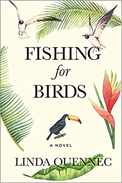
 |
Author Quennec masters juxtaposition and paradox in this unassuming but powerful debut novel. The viewpoints of three Vancouverites—young widow Kate, her mother Nora, and Kate’s elderly friend Ivy—alternately diverge and converge as they explore the contexts of their lives and loves in a New Agey island community near the northwestern coast of Canada. Thirty-two-year-old Kate is recovering from an unhappy marriage that ends prematurely in a tragic accident. Her middle-aged mother Nora, ever practical and inflexible, is on the cusp of a major life transition. Nonagenarian Ivy bravely faces her imminent death forearmed by reconciliation with loss and grief. Their experiences inform and enrich one another’s perspectives about what it means to be fully alive and joyful no matter how mundane or harrowing the journey. Often the viewpoint of one woman speaks for all: “She twins herself, cloned into something she never gets to be back home—something that feels.”
All of the characters in this story are eminently likable and well-rounded in their strengths, weaknesses, and aspirations. The plots and subplots could clash in a jarring way, but Quennec’s expert prose quietly glides through highs and lows, seamlessly alternating between modern-day British Columbia and the colorful summer of 1926 on a tropical Cuban quay. Much like the islanders in the two disparate environments who explore the literal and metaphorical beach, forest, and ever-present waters in their individual contemplations, the narrative examines the extremes and median points of many social and experiential spectrums: convention vs. individuality, filial piety vs. romance, tradition vs. spontaneity, expectation vs. discovery, and severity vs. resilience. These multifaceted stories within stories are familiar and yet riveting, repeatedly drawing awareness to the ultimately simple lesson of embracing our innate human ability to accept the impermanence of all we hold dear.
RECOMMENDED by the US Review